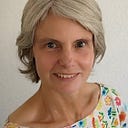Claudia Kleinert: We would then be an App

We spoke with frontwoman Claudia Kleinert from famous ARD weather broadcasting show (German TV station). She explained the role of artificial intelligence for her (future) work. If anyone comes across who wants to predict how the winter season will turn out, this one will not be her colleague. Dear Claudia Kleinert, it was a really nice conversation. Thank you for the look behind the scenes.
She is a showpiece. As a presenter, she flickers across the screen 10 times a day for three minutes and has been doing so for many years. No one can get past her. She “only” talks about the weather, but that moves everyone. Kleinert studied business administration, took elocution lessons at the same time and worked as a presenter at WDR. And then, at some point and almost banal and incidentally her chance came. That’s when the Düsseldorf Weather and Travel Channel was founded; she called, was cast and accepted. That’s it.
And today? Today she has enormous expertise and a lot of experience in weather forecasting. The interview with her was somehow a must after the conversation with Professor Roland Potthast of the German Weather Service (DWD). After all, she obtains a database from the DWD that should not be underestimated for her broadcasts, five of which are recorded and 5 pm live.
ARD uses various forecast models. Anyway, the analytical evaluation is not everything, a person has to check it for validity. “Otherwise, we would be an app. Can that be true what a model ejects?“ And she is serious about it. If she meets someone who wants to predict how the winter season will turn out, this person is not her colleague. She says: “In March/April we were told that it would be another very warm and much too dry summer. That the months would be rather too warm is certain, but that will most likely be the case for the next ten years. Important is what you compare. “One day with another is bullshit.”
Hence, one can’t predict anything long in advance at all? “We can’t, or only very rarely. 3-month forecasting is crystal ball look-alikes”, and it would be presumptuous — even to want to do it at all — these are chaotic systems. Basically, we can’t look any further ahead than four or five days. Unless a weather situation is so obvious that all models are certain. But even then, predictions about seasons months ahead are impossible.”
Would artificial intelligence help?
It would. For example, it could help to identify low-pressure areas which exactly the same data as a previous one. AI could detect probabilities of where this would turn to, but: “that doesn’t really help me either. It just tells me the probability of where the area will go. It’s like trying to predict white Christmas in June. If I calculate a probability of, say, 20 per cent, the statement is simply that snow for Christmas is very rare. But let me be bold and say that Christmas 2020 will be dry and quite green and rather too warm. And I am probably even right about that. But it is also possible that I am completely wrong, but no one will remember what I once said. And that’s why so much bungle will happen.
Claudia Kleinert, like Potthast, by the way, thinks that artificial intelligence can certainly do an important service in weather forecasting. But before she goes into raptures, she rather points out the great importance of good models. They should be able to reckon with as many parameters and their deviations as possible, as well as many weather stations.
Today Kleinert works at full speed every day
Finally asked: Do you enjoy your job? “No, it is much more than that. I love and live for my profession. If I wasn’t putting all my heart into it, I wouldn’t have been doing it for so many years. We do one show after the other. Between 4.45 pm and 6.30 pm I don’t know my name. And I love this challenge.”
She likes the topicality. She has no teleprompter or any other prepared text. She stands in front of the camera and says what she has thought about. And if her colleagues throw something to her 20 seconds before the show, she spontaneously takes it in. She is all alone in the room during a show. Only the latest weather reports, radar or satellite images: she always has them in view. “And I like that a lot.”
Despite the short-term nature of her broadcasts, what does Kleinert say about the long-term development of the weather? “It is getting warmer. And high temperatures mean heat stress, often more heavy rain. Overall, extreme weather is increasing.” Will hurricanes become more frequent then? Not necessarily, but they will become stronger: the effects, such as torrential rain, will become more extreme.
The face of ARD Wetternews has studied business administration. She had meteorological training and then finally took a few semesters of meteorology. “But the studies didn’t really help me at all for this job. I read up on the background knowledge and we had colleagues back then who taught us what was important in forecasting and evaluating weather data.
Thank you for the interview, Claudia Kleinert!
